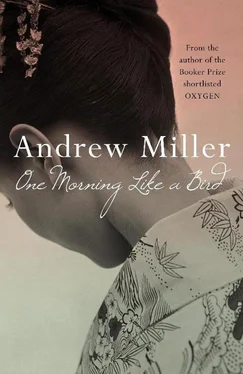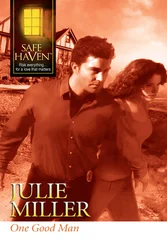‘Who?’ Junzo’s face lights up with a smile of utter misery. ‘Who do you think?’ He shivers. He has no coat, only his khaki tunic. ‘You’ve always been blind,’ he mutters, starting to shuffle away. There is no question of Yuji following him this time. He tries to remember where he left his bicycle. He remembers the pleasure of riding it. It seems to have been months ago.
‘If you had said,’ he calls, his voice loud as a dog’s bark in the hush of the street, ‘If you had said you loved her . .’ And though he cannot be certain at such a distance, cannot be sure through his bloodshot eyes, it seems that his friend, nearing the unlit corner, falters in his stride and stumbles against nothing.
He wakes with a taste of ash in his mouth, smoke and ash. Slowly, reluctantly, he opens his eyes to the light on the ceiling, then turns to where Miyo is kneeling beside him, a piece of sewing in her hands (the same piece she has pretended to be working at ever since Mother and Father left for Kyoto). When she sees him looking at her, she smiles excitedly.
‘You’re like a hero,’ she says. ‘Everyone knows about it. Even Mr Kitamura must be impressed!’
‘Kitamura . .’ mumbles Yuji, then shuts his eyes again. He has aches, mysterious zones of pain, but no fever. He is not even particularly tired.
‘The doctor is coming,’ she whispers, leaning over him so close he can feel her breath on his face. ‘The honourable doctor . .’ And immediately, as though he has been listening outside the door, waiting for his cue, Kushida appears. Glasses, moustache, leather bag. Large pale hands.
‘So how is the young master of the house?’ he asks, standing above the bed, the padded shoulders of his civil defence jacket outlined by the light coming through the platform door. ‘It turns out you are the type who quite unexpectedly shows initiative. Even a sort of courage.’
‘Do you know about the old woman?’ asks Yuji. ‘The bathhouse-keeper’s wife?’
Kushida makes a movement, a small gesture involving eyes, fingertips. A gesture to signal indifference. ‘I don’t believe,’ he says, ‘we should keep you away from the army much longer, do you? You should be storming an enemy machine-gun post rather than the local bathhouse. The public baths, by the way, are not at all hygienic. A tremendous source of contagion. If every bathhouse in the city burnt down we would be much the healthier for it.’
He bandages Yuji’s swollen knee, dresses the burns on his left wrist, his left ear. ‘Should I send the bill to your father? When can we expect to see the professor again?’
‘You can send it to me,’ says Yuji, sitting, then easing himself up from the mattress. ‘Or if you prefer it I can pay you now. If you could wait downstairs? Miyo will bring you some tea.’
For the remainder of the day, of daylight, Yuji stays inside the house. When he moves he leans on a stick, a curious varnished black ornamental walking stick Father brought back from his tour of Europe and which for years — all the years of Yuji’s life — has stood among the umbrellas in the pot in the vestibule. He has attacks of coughing, spits black phlegm, blows black mucus from his nose. How has he survived it all? What does his body want of him? He puts on the radio but after an hour could not have told anyone what he has been listening to. Saburo calls. Yuji has already instructed Miyo to say he is too unwell to receive visitors. He drinks a cup of sake but finds, to his disappointment, he has no appetite for a second. At six o’clock he sends Miyo to Otaki’s for noodles. They eat. She steals glances at him, looks of wonderment. Later, he bathes, sitting in the water with his leg raised to keep the bandages dry. After the bath he starts to shake. This gives him some comfort, some hope. Now, perhaps, he is about to fall ill, to lie dangerously ill for weeks, and then, of course, a long convalescence during which the world will simply right itself. What can be expected of a man too weak to hold a cup to his lips? He goes upstairs, crawls under his quilt, prepares to descend to the familiar confusion of fever, of the blood in riot, but the shivering stops. He cannot even sleep, cannot get close to it. He gets up, dresses, limps down the stairs and tells Miyo he is going out. She stares at him as if expecting news of another fire, then squats by the vestibule step to tie his laces. He waits, stands awhile, watching from the half-open door. He can hear Itaki in conversation with someone. When the voices cease he turns up his collar, pulls down the brim of his hat, and lurches to the gate.
It takes him forty minutes to reach the tram-stop. He’s sweating. The pain in his knee has made him nauseous. On the tram he wonders if the other passengers, seeing him, his age, assume that his limp is a war wound. He gets down at the stop before the cathedral, walks under its immense shadow, then enters Feneon’s garden by the gate behind the rose bush. The moonlight that lit his view from the platform last night now lies in a tangle of bones below the bare branches of the magnolia. From the house he can see no sign of life at all. He presses his face against a window — the only one unshuttered — and sees over the salon floor a thin stain of electric yellow that comes, must surely come, from beneath the study door. He taps on the glass, taps again more loudly, keeps tapping until the light suddenly swells and a figure appears, pauses, then comes cautiously forwards. Yuji lifts off his hat, shows himself, but it is not until the Frenchman’s face is almost touching the glass on the other side that he recognises him, frowns, and points towards the kitchen door.
The moment Yuji is inside, Feneon slides home the bolts. The kitchen is several blocks of minimally variegated black. There is a smell of the food cooked earlier that evening. Grilled meat? Grilled chicken, perhaps.
They go to the study. The lamp with its green shade is the only source of light. On the big desk there are scattered sheets of writing paper, a fountain pen laid at the side of a half-written-over sheet.
‘You’ve had an accident?’ asks Feneon, leaning against a corner of the desk and looking at Yuji, at the black stick, the dressing on his ear.
‘A fall,’ says Yuji. ‘My knee. It’s not serious.’
‘Sit,’ says Feneon. He points to the armchair at the side of the desk. Yuji sits. He is not quite sure where to put the stick. In the end he holds it across the top of his thighs, gripping the wood in his fists. ‘So,’ says Feneon, ‘what’s this all about? I assume it must be important.’
Yuji nods. He has, in the few hours he has been at liberty to do so, forbidden himself to imagine the details of this moment. But now it has come he is seized by doubts. Is it possible he misunderstood what Junzo was saying? That Feneon will think he has gone mad? That the study door will open and there will be Alissa, unaltered? He plants the end of his stick on the floor, levers himself up. He has not misunderstood. The door will not open.
‘I saw Junzo last night,’ he says, addressing a cedilla of faded blue tapestry in the rug between them. ‘He informed me of . . a certain fact. It concerns your daughter.’ He lifts his gaze. There is a not quite convincing expression of gentle bemusement on Feneon’s face. ‘Her situation,’ says Yuji.
‘Her situation?’
‘Her difficult situation.’
‘I see,’ says Feneon. ‘Yes. I see.’ He rubs his knuckles softly over the burnished wood of the desk. ‘Heaven knows how Junzo learnt about it. This city is even worse than Saigon for keeping secrets. I should have known it was pointless . .’ He shrugs. ‘Though with half the world on fire and the other half about to catch, it begins to seem almost unimportant. What people think. What they know. I pity the poor child, arriving at such a moment.’
Читать дальше












